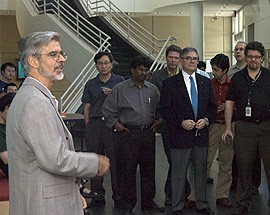Oct 20 2008
The American Physical Society has awarded a UT Dallas researcher one of the society's highest honors, recognizing Dr. Yves Chabal's development of methods to better understand processes that take place on the silicon surface that is literally the platform for the multibillion-dollar semiconductor industry.

"Yves's development of infrared spectroscopy in the 1980s to understand the processes that occur on silicon surfaces during semiconductor manufacturing changed how everyone in the semiconductor industry does their work," said Bruce Gnade, vice president for research at UT Dallas. "His work has had tremendous impact. In the world of infrared spectroscopy of semiconductor surfaces,Yves is the world's expert."
Dr. Chabal is head of the Materials Science and Engineering Department in the Erik Jonsson School of Engineering and Computer Science at UT Dallas and the first holder of the school's Texas Instruments Distinguished University Chair in Nanoelectronics.
The Davisson-Germer Prize is a biennial award given to recognize and encourage outstanding work in atomic or surface physics. Dr. Chabal was chosen as the 2009 recipient of the prize "for the individual development and collaborative application of fundamental surface infrared spectroscopy and quantum chemical methods to silicon surface reactions important in microelectronics," according to the society's official announcement.
Dr. Chabal and his co-recipient of the award, Krishnan Raghavachari of Indiana University, were colleagues at Bell Labs, where Dr. Chabal spent 22 years prior to joining Rutgers University in 2003. The State of Texas Emerging Technology Fund's Nanoelectronics Research Superiority Initiative was instrumental in bringing Dr. Chabal to UT Dallas from Rutgers earlier this year.
"Yves Chabal is a perfect example of the kind of outstanding researchers whom we are committed to attracting to UT Dallas as we advance toward becoming one of the nation's top research universities," said UT Dallas Provost Dr. Hobson Wildenthal. "This well-deserved honor is a tribute to Dr. Chabal's past work, but I think it is also a harbinger of the great things we will see emerge from his lab in the future."